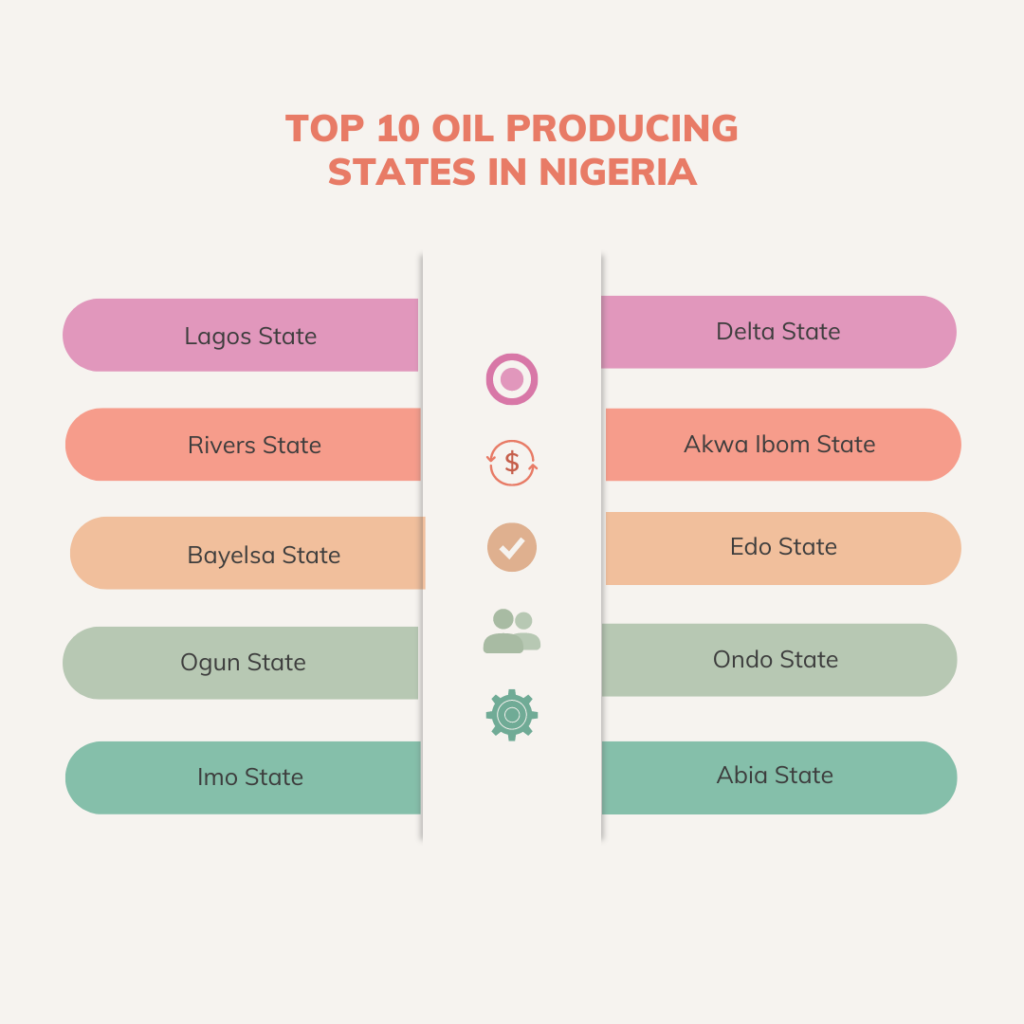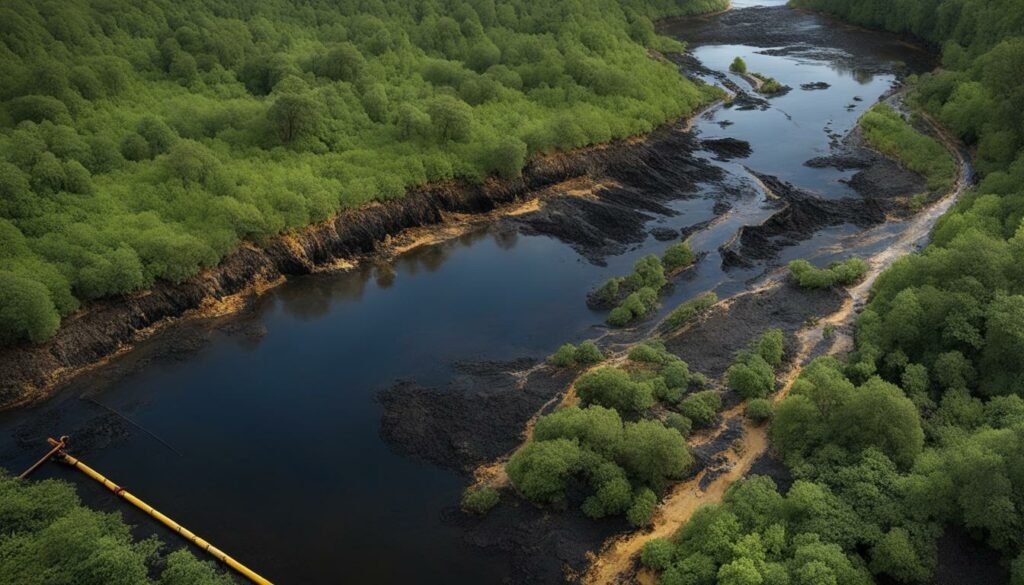Welcome to our article on the top oil producing states in Nigeria. Nigeria is one of Africa’s largest oil producers and plays a significant role in the global oil market. Understanding the key insights of Nigeria’s oil industry and its top producing states is essential for gaining a comprehensive understanding of the country’s petroleum sector.
With vast reserves and a well-established industry, Nigeria has emerged as a major player in the oil and gas sector. The country’s oil production is concentrated in several states, each contributing to Nigeria’s overall output. These states not only drive the nation’s economy but also play a significant role in meeting global energy demands.
Throughout this article, we will delve into the top oil producing states in Nigeria, explore their production capabilities, and analyze the importance of the oil industry in Nigeria’s economy and the global oil market.
So, let’s dive in and uncover the key insights of Nigeria’s top oil producing states!
Key Takeaways:
- Nigeria is one of Africa’s largest oil producers.
- The country has significant oil reserves and a well-established oil industry.
- Nigeria’s oil production is concentrated in several states.
- The top oil producing states in Nigeria drive the nation’s economy and contribute to meeting global energy demands.
- The oil industry plays a vital role in Nigeria’s overall economy and its position in the global oil market.
Overview of Nigeria’s Oil Sector
Nigeria is a prominent player in the global oil industry, with a rich history and vast resources in the sector. The oil industry in Nigeria has been a key driver of economic growth and development, contributing significantly to the country’s GDP and export earnings. Nigeria ranks among the top oil producers in Africa and is a major player in the international oil market.
Nigeria’s Position in Global Oil Markets
Nigeria holds a strategic position in the global oil markets. As one of the largest oil producers in Africa, Nigeria plays a crucial role in meeting the global demand for oil. The country’s oil and gas production capabilities have made it a vital player in the international energy landscape.
Impact of Oil on Nigeria’s Economy
The oil sector has a significant impact on Nigeria’s economy. Oil exports account for a substantial portion of the country’s revenue and foreign exchange earnings. The revenue generated from oil production supports various sectors of the economy, including infrastructure development, healthcare, education, and social welfare programs.
Recent Trends and Disruptions in Oil Production
Nigeria’s oil production has faced several challenges in recent years, including disruptions caused by pipeline vandalism, security issues in the Niger Delta region, and fluctuating oil prices in the global market. These disruptions have had an impact on the country’s oil production and export capabilities, affecting its standing in the global oil market.
| Year | Crude Oil Production (Million Barrels Per Day) |
|---|---|
| 2017 | 1.99 |
| 2018 | 1.81 |
| 2019 | 2.00 |
| 2020 | 1.78 |
Oil Producing States in Nigeria
In this section, we will explore the current oil producing states in Nigeria and highlight the major ones. Nigeria is renowned for its abundant oil reserves, making it one of the leading oil producing countries in Africa. The country’s oil industry plays a crucial role in its economy and has a significant impact on the global oil market.
Here is a list of the top 10 oil producing states in Nigeria:
These states are responsible for the majority of Nigeria’s oil production and contribute significantly to the country’s oil reserves. They also play a crucial role in the development of Nigeria’s oil and gas sector.
Challenges in the Nigerian Oil Industry
The Nigerian oil industry faces several challenges that impact its operations and growth. These challenges include pipeline vandalism and theft, infrastructure and maintenance issues, as well as the legal and regulatory framework governing the industry.
Pipeline Vandalism and Theft
One of the biggest challenges in the Nigerian oil industry is pipeline vandalism and theft. Criminal organizations and individuals target oil pipelines to illegally siphon off crude oil for their own profit. This not only leads to significant revenue loss for the Nigerian government and oil companies but also causes environmental damage and poses a safety risk to nearby communities.
Infrastructure and Maintenance Issues
The Nigerian oil industry faces infrastructure and maintenance challenges that hinder its efficiency and productivity. Aging infrastructure, lack of proper maintenance, and inadequate investment in upgrading facilities lead to frequent breakdowns, production disruptions, and increased operational costs. This affects the overall performance of the industry and its ability to meet production targets.
Legal and Regulatory Framework
The legal and regulatory framework governing the Nigerian oil industry presents its own set of challenges. Complex and sometimes outdated regulations, bureaucratic bottlenecks, corruption, and inadequate enforcement affect the industry’s ability to attract investment, implement innovative technologies, and operate in a transparent and efficient manner. A comprehensive review and reform of the legal and regulatory framework are necessary to create a conducive environment for sustainable growth and development of the industry.
Addressing these challenges is crucial to ensure the long-term viability and success of the Nigerian oil industry. Efforts must be made to enhance security measures, improve infrastructure and maintenance practices, and implement effective and transparent regulations that promote investment and competitiveness.
Next, we will explore the future prospects and initiatives in Nigeria’s oil industry, including new offshore exploration opportunities, reforms under the Petroleum Industry Act, and investments in refinery and production facilities.
Future Prospects and Initiatives
In order to maintain and expand its position in the global oil market, the Nigerian oil and gas sector is actively pursuing future prospects and initiatives. These efforts include exploring new offshore opportunities, implementing reforms under the Petroleum Industry Act, and making significant investments into refinery and production facilities.
New Offshore Exploration Opportunities
Nigeria’s extensive coastline offers immense potential for offshore exploration. The country is actively seeking partnerships with international oil companies to tap into untapped reserves in deepwater and ultra-deepwater areas. By leveraging advanced technologies and expertise, these offshore projects have the potential to significantly increase Nigeria’s oil production and reserves, contributing to the nation’s energy security and economic growth.
Reforms Under the Petroleum Industry Act
The recent implementation of the Petroleum Industry Act aims to attract more local and international investments into the Nigerian oil and gas sector. This comprehensive reform provides a more transparent and streamlined framework for exploration, production, and all aspects of the petroleum industry. By creating a more favorable business environment, the reforms are expected to enhance operational efficiency, promote sustainable development, and stimulate growth in the sector.
Investment into Refinery and Production Facilities
To reduce dependency on imported petroleum products and create value-added opportunities, Nigeria is allocating significant resources into the development of refinery and production facilities. The government, in partnership with private investors, is funding the construction and modernization of refineries, aiming to increase domestic refining capacity and reduce the need for imports. This strategic investment will not only boost Nigeria’s self-sufficiency in energy but also create employment opportunities and stimulate economic development across the country.
| Initiative | Objective | Impact |
|---|---|---|
| New Offshore Exploration | Tap into untapped reserves in deepwater areas | Increase oil production and reserves, enhance energy security |
| Petroleum Industry Act Reforms | Attract more investments into the sector, enhance transparency | Promote operational efficiency, stimulate growth in the industry |
| Investment in Refinery and Production Facilities | Increase domestic refining capacity, reduce import dependency | Boost self-sufficiency, create employment, stimulate economic growth |
Conclusion
In conclusion, Nigeria’s oil industry plays a vital role in the country’s economy and global oil markets. The top oil producing states in Nigeria, such as Lagos, Akwa Ibom, and Delta, contribute significantly to the country’s oil production and exploration efforts. These petroleum producing states in Nigeria are known for their rich oil fields and continuous exploration activities.
The Nigeria oil industry has faced various challenges, including pipeline vandalism and theft, infrastructure and maintenance issues, and a complex legal and regulatory framework. However, the Nigerian government is taking initiatives to address these challenges and foster growth in the industry. Reforms under the recently passed Petroleum Industry Act aim to improve the regulatory framework, attract investment, and strengthen the overall oil and gas sector in Nigeria.
Looking to the future, Nigeria’s oil industry has promising prospects. New offshore exploration opportunities offer immense potential for discovering and extracting more oil reserves. Additionally, investments in refinery and production facilities are expected to enhance Nigeria’s capacity for oil processing and export. These initiatives, combined with the expertise and resources of Nigeria’s top oil producing states, position the country as a significant player in the global oil market.
FAQ
What are the top oil producing states in Nigeria?
The top oil producing states in Nigeria are Delta, Akwa Ibom, Rivers, and Lagos.
How much oil does Nigeria produce?
Nigeria is one of the largest oil producers in Africa, with an average production of around 1.8 million barrels per day.
What is the significance of the oil industry in Nigeria’s economy?
The oil industry is a major contributor to Nigeria’s economy, accounting for a significant portion of the country’s revenue and foreign exchange earnings.
What recent trends and disruptions have affected oil production in Nigeria?
Recent trends and disruptions in Nigeria’s oil production include pipeline vandalisms, security issues in the Niger Delta region, and fluctuations in global oil prices.
Which states are currently the major oil producing states in Nigeria?
The major oil producing states in Nigeria are Delta, Akwa Ibom, Rivers, Bayelsa, and Lagos.
What are some challenges faced by the Nigerian oil industry?
The Nigerian oil industry faces challenges such as pipeline vandalisms and theft, infrastructure and maintenance issues, and a complex legal and regulatory framework.
What are the future prospects and initiatives in Nigeria’s oil industry?
The future prospects and initiatives in Nigeria’s oil industry include new offshore exploration opportunities, reforms implemented under the Petroleum Industry Act, and investments into refinery and production facilities.












![How to Improve Employee Welfare? [7 Ways] 11 How to Improve Employee Welfare](https://zoets.b-cdn.net/wp-content/uploads/2024/02/pexels-alexander-suhorucov-6457577-scaled-e1708707251724.jpg)